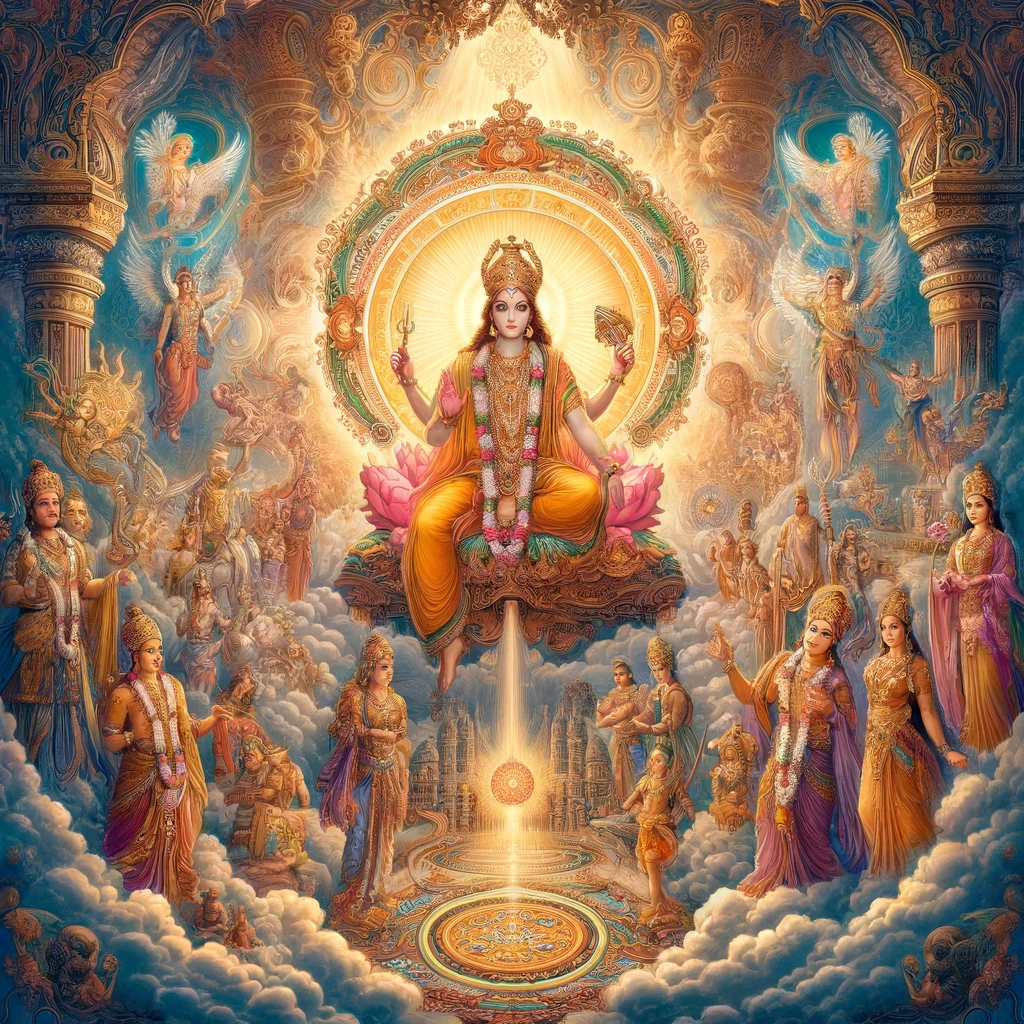ಉದ್ಭವಃ ಕ್ಷೋಭಣೋ ದೇವಃ ಶ್ರೀಗರ್ಭಃ ಪರಮೇಶ್ವರಃ
ಕರಣಂ ಕಾರಣಂ ಕರ್ತಾ ವಿಕರ್ತಾ ಗಹನೋ ಗುಹಃ ||41||
(374) udbhavaḥ (375) kṣobhaṇo (376) devaḥ (377) śrīgarbhaḥ (378) parameśvaraḥ
(379) karaṇaṃ (380) kāraṇaṃ (381) kartā (382) vikartā (383) gahano (384) guhaḥ ||41||
374) udbhavaḥ (ಉದ್ಭವಃ)
In the cataclysmic times, the Lord exists in a subtle form within the universe. At the time of creation, the universe emerges explosively from the navel of the Lord. Thus, the world, which takes on names and forms, is created by the divine emergence.
375) kṣobhaṇo (ಕ್ಷೋಭಣಃ)
The Lord who agitates the wicked is known as the kṣobhaṇo (Agitator).
376) devaḥ (ದೇವಃ)
This name is familiar to everyone. Regardless of caste or religion, everyone addresses the Lord as 'God.' Interestingly, the meaning behind this well-known name remains unknown to many! Let's explore what the term 'God' means. The word 'Deva' originally comes from the root 'divu.' In ancient verb lists, this root can have seven meanings: 1) brilliance, 2) victory, 3) radiance, 4) praise, 5) transaction, 6) play, and 7) motion. Recently, three more meanings have been added: joy, intoxication, and dreams, although these are not found in ancient verb lists. Let's briefly look at the original seven meanings. 1) Brilliance: The form of light itself, God illuminates our inner being with the light of knowledge just like the sun and the moon give light. 2) Victory: God is the highest among all, the form of victory. 3) Radiance: The one who can create merely by wishing, who gives us our desires and fulfills them according to our capacities. 4) Praise: The one praised by all; the God who is the subject of all speech. 5) Transaction: The one who conducts all the affairs of the world. 6) Play: Creation, sustenance, and destruction are but a play to God; birth and death, all transactions are His play. 7) Motion: The giver of movement and knowledge. The one who moves everywhere, knows everything, and resides within everyone as a reflection is 'God.' Thus, the name 'God' encompasses many meanings. The joy derived from contemplating these meanings when saying 'Oh God' is immense. Such is the power in the name of the Lord. For this reason, the saint Purandara Dasa has playfully said, 'Why You, what to You, if the goodness of Your name exists, that's enough.'
377) śrīgarbhaḥ (ಶ್ರೀಗರ್ಭಃ)
'Sri' means wealth. All wealth originates from the body of the Lord. He from whose womb all the Vedas emerged is known as Srigarbha. The Lord, who is the abode of Lakshmi, the embodiment of all the Vedas and all wealth, is Srigarbha.
378) parameśvaraḥ (ಪರಮೇಶ್ವರಃ)
Isha, Ishwara, Paramesha, and Parameshwara are all words that roughly convey the same meaning. Isha means capable. The deities that control us are the Ishas. Those who control them are the deities associated with the inner self and life force, such as Garuda, Sesha, Rudra, and Brahma-Vayu. The one who is the regulator of these deities, who resides at the highest level, and who is the lord of all, is known as Parameshwara.
379) karaṇaṃ (ಕರಣಂ)
The primary cause of everything is Karana. Karana is extraordinary. For example, the eye is 'Karana' for seeing shapes, and the ear is 'Karana' for hearing. If we break down the word, we get K+R+Na; where 'K' stands for joy, 'R' for play, and 'Na' for goodness. Therefore, Karanam means the form of joy, the form of goodness, and the form of play, which is the Lord.
380) kāraṇaṃ (ಕಾರಣಂ)
The instrumental cause of everything is K+Ar+Na. Here, 'Ar' means 'indestructible'. The Lord is the form of eternal joy, indestructible. His play governs this universe. K+A+Rana - here, 'Rana' means declaration. The Lord, as the form of joy, is declared by the Vedas as an extraordinary power.
381) kartā (ಕರ್ತಾ)
The one who can do everything independently without the help of others is the doer. Before the Lord, we are just like puppets on a string. We have no freedom; we move as the puppeteer directs. The true doer, who inspires the mind, is the Lord.
382) vikartā (ವಿಕರ್ತಾ)
The one who creates a diverse creation is Vikarta. The creation of the Lord is filled with wonder and diversity. No two things are alike; no two leaves of a tree are the same, and no two people are identical. Thus, the Lord, who has created this diverse creation, is Vikarta.
383) gahano (ಗಹನಃ)
The Lord is the most mysterious. Only His creation is visible to us, but He Himself is not seen. To understand Him, one must delve into the scriptures and make an effort.
384) guhaḥ (ಗುಹಃ)
He who is hidden in the cave of the heart, dwelling in the center of the heart's lotus, never reveals Himself. He does not become visible until the soul's endeavors are complete. Only after self-realization can one see Him in His true form.


